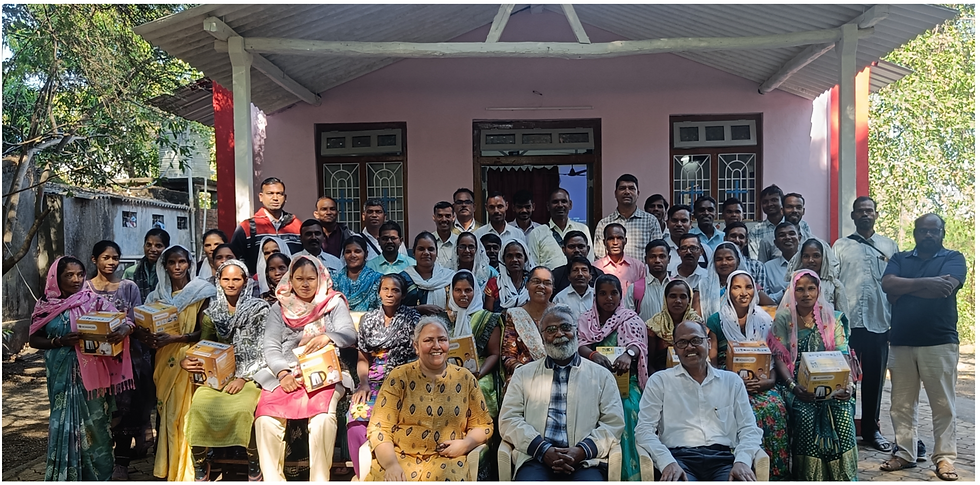Heroes of Faith: Dwight L. Moody
- John Hill

- Jun 13, 2021
- 4 min read

Moody has been called the Billy Graham of the nineteenth century, but it is more accurate to say that Billy Graham is the Dwight Moody of the twentieth. Moody’s passion for preaching, evangelism, and comprehensive service to all humanity is profoundly moving for any Christian.
Dwight Lyman Moody was born in Northfield, Massachusetts, on February 5, 1837. He was the seventh child born to Edwin Moody, a farmer and stonemason, and Betsey Holton Moody. Edwin died when Dwight was only four years old, and a set of twins were born one month after Edwin’s death.
The family struggled greatly, and Betsey faced no other option but to send the children away to work in exchange for room and board. However, during this time, Betsey was sure to send the children to the church. When Moody was 17, he moved to Boston to live with his uncle and work in his shoe store. One of his uncle’s requirements was that Dwight attend worship at the Congregational Church of Mount Vernon. While there, in April 1855, Moody was converted by his Sunday School teacher Edward Kimball. Though Moody was “saved,” he was not received into membership of the congregation until May 4, 1856.
During the early years of the Civil War, Moody secured an abandoned saloon and converted it into a meeting place for his Sunday School. One worshiper reported that when he arrived late, he saw Moody holding a young black boy trying to read to him the story of the Prodigal Son. The witness reported that Moody was unable to pronounce many of the complex words. He went on to record, “if the Lord can ever use such an instrument as that for his honor and glory, it will astonish me.” John Pollock records that within one year, this tiny school’s average attendance was 650 and was so well known that President Lincoln visited the congregation and spoke at a Sunday School meeting on November 25, 1860.
On August 28, 1862, Dwight married Emma Revell and produced a daughter, Emma Reynolds Moody, and two sons, William Revell Moody and Paul Dwight Moody. William compiled the first genuinely comprehensive biography on his father and published it in 1900. Paul later authored several books and collections of sermons, articles, and quotes. Paul later served as pastor of the South Congregational Church in St Johnsbury, Vermont, and president of Middlebury College.
In October 1871, the Great Chicago Fire destroyed Moody’s residence, church building, and many congregants’ homes. The Moody family was entirely destitute. He is reported to have said that he had nothing except his reputation and his Bible. Moody later moved into the country near his birthplace in East Northfield, Massachusetts.
In the spring of 1872, Moody became a well-traveled and sought-after evangelist and traveled to the United Kingdom. He preached hundreds of times to thousands. One report by Paul indicates while preaching in the Botanic Gardens Palace, he preached before a crowd of over 15,000 persons.
Moody is credited with the extensive use of “The Wordless Book.” This tool was initially designed by Charles Surgeon that consisted of (then) three colors. Moody added a fourth: black representing one’s sinful state, red for the blood of Jesus, white representing the regeneration of the soul through the Spirit, and gold for the glory of heaven. Other versions have materialized over the years to include blue for baptism and green for spiritual growth.
Moody preached his last sermon on November 16, 1899, in Kansas City, Missouri. He became ill and returned to his home in Northfield. Friends noted he had gained about 30 pounds within a relatively short period of time. Some speculate Moody suffered from congestive heart failure. He died at home surrounded by his family and friends on December 22, 1899.
Moody’s message was simple—3 R’s. Man was ruined by the Fall, yet the Blood of Christ redeemed him, and he was regenerated by the Spirit. It is further noted by biographers that Moody conducted himself by three main principles: (1) Evangelical unity focused on the Gospel of Christ, (2) to show love and generosity to all, and (3) to nurture a worldwide fellowship or faithful believers.
I would be remiss if I did not include in this brief article some of his most interesting quotes:
— “God hates the sin, but He loves the sinner.”
— “As I go into a cemetery, I like to think of the time when the dead shall rise from their graves…Thank God, our friends are not buried, they are only sown!”
— “Excuses are the cradle that Satan rocks men off to sleep in.”
— “I am glad there are things in the Bible I do not understand. If I could take that book up and read it as I would any other book, I might think I could write a book like that.”
— “Some day you will read in the papers that D.L. Moody, of East Northfield, is dead. Don’t you believe a word of it! At that moment I shall be more alive than I am now. I shall have gone up higher, that is all—out of this old clay tenement into a house that is immortal; a body that death cannot touch, that sin cannot taint, a body fashioned like unto his glorious body. I was born of the flesh in 1837. I was born of the Spirit in 1855. That which is born of the flesh may die. That which is born of the Spirit will live forever.”
William R. Moody. The Life of Dwight L. Moody (New York: Fleming H. Revell Co., 1900).
John C. Pollock, Moody: The Biography (Chicago: Moody, 1984).
YouTube.com “Moody” (the Movie) (Quadrus Film Presentation, 2004). [**This video is quite dated, but an excellent 52-minute summary of Moody’s life and ministry.]




Comments